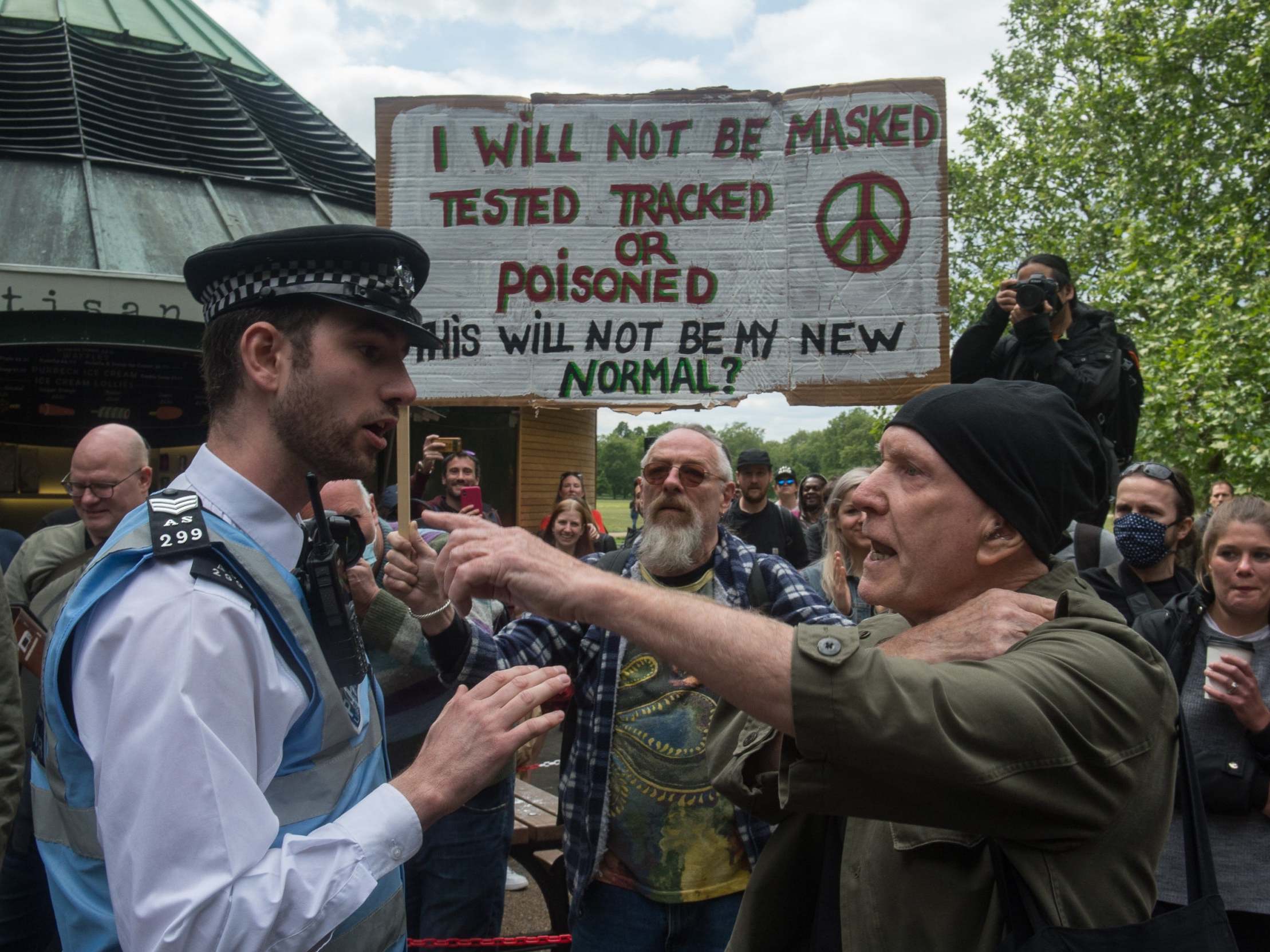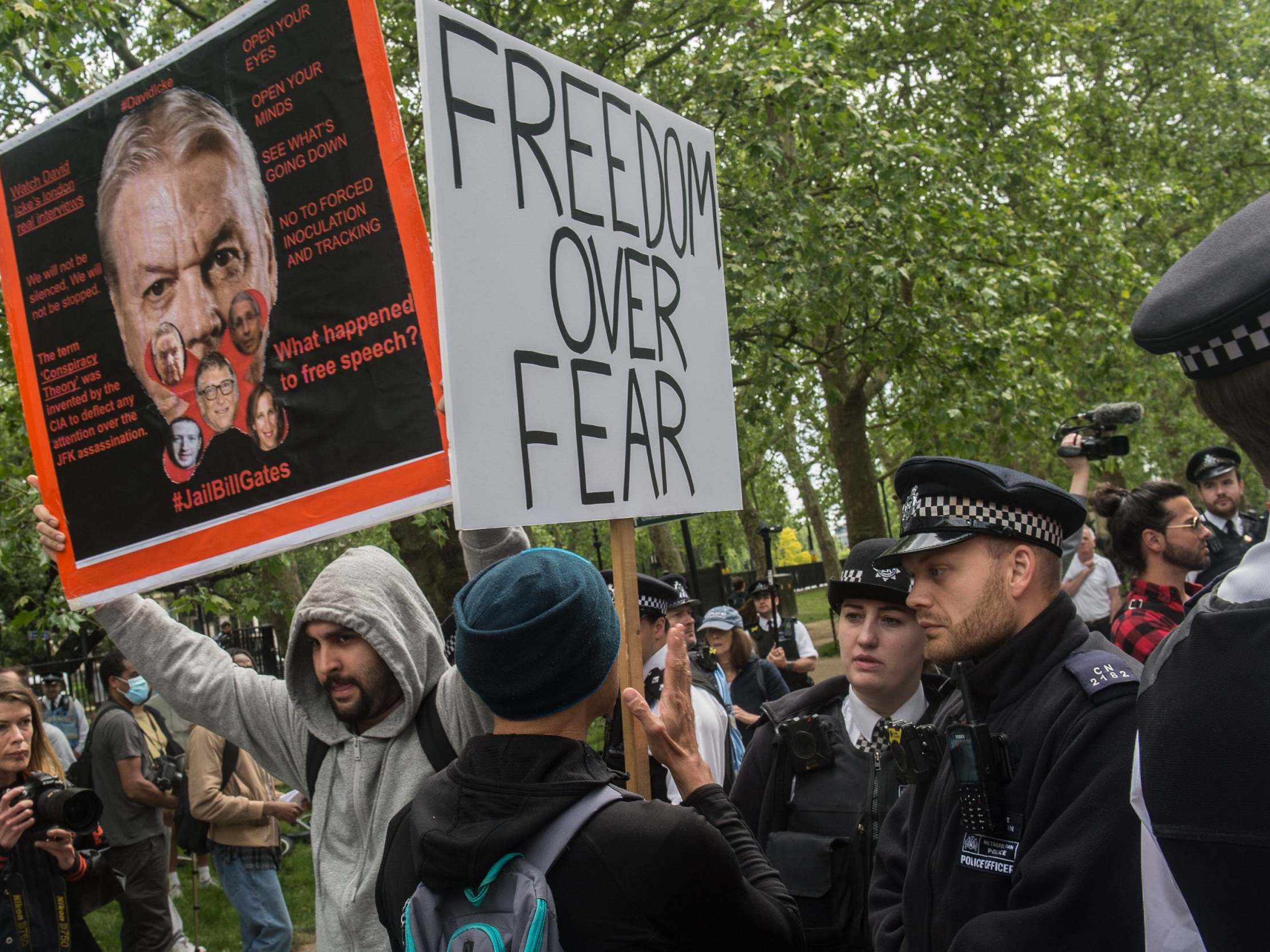Coronavirus conspiracy theories must be taken seriously to avoid ‘serious consequences’, extremism chief warns
Exclusive: Conspiracies can be used to 'incite hatred, violence or justifying terrorism', head of Commission for Countering Extremism tells Lizzie Dearden

Conspiracy theories must be tackled by the government before they can be used to spark violence and terrorism, the UK’s extremism chief has said.
Sara Khan, who leads the Commission for Countering Extremism, said the coronavirus pandemic was seeing “wacky” claims move into the mainstream and have real-world consequences.
“We’ve seen the conspiracy theories around 5G and how masts are being attacked – there are serious consequences to that,” she told The Independent.
“We’ve always treated conspiracy theories as being something harmless, wild and wacky but I think that’s been a mistake.
“We need to classify them based on harm and the types of behaviours they encourage. If they are inciting hatred, violence or justifying terrorism that’s not harmless. We need a better and more sophisticated policy response.”
Research by Ofcom shows that baseless claims linking 5G technology to the spread of coronavirus is the most commonly encountered conspiracy theory in the UK.
It has led to vandalism of masts across the country and attacks on telecoms workers.
Others theories include allegations that China created Covid-19 as a biological weapon and deliberately released it, or that the pandemic is part of a “new world order” plot to reduce the global population.
Chants of “jail Bill Gates” were shouted at a recent anti-lockdown protest in London after the Microsoft founder was linked to the supposed plot, and an alternative theory accusing him of profiting from vaccinations.
Some extremist groups have used the outbreak to sow disinformation about Muslims, Jews and vulnerable groups.
Many conspiracy theorists are spreading claims that coronavirus is either fake or not as deadly as portrayed by authorities and health experts, encouraging people to disregard health advice.
Anti-vaxxers have jumped on the crisis to spread long-standing claims that inoculations are harmful and call for people to reject any Covid-19 vaccination that may be developed.

Ms Khan said a strategy must be developed to deal with conspiracy theories before they become normalised.
“Technology is allowing them to go from the fringe into the mainstream,” she added.
“It’s got to be dealt with in a much more robust way than before because of the serious harm that it’s causing.”
Ms Khan said that there were still many conspiracy theories that should not spark intervention, but called for them to be properly assessed rather than brushed off.
“You’ve got all sorts of wild and wacky ones that are harmless but we need to have a more sophisticated classification based on harm,” she added.
“Conspiracy theories are the bread and butter tactics of extremist groups.
“It’s the way they radicalise people, it’s the way they attempt to normalise extremist narratives and cross over into the mainstream. It’s a clear tactic of extremist groups, which is why as an organisation we are deeply concerned.”
The “great replacement” or white genocide conspiracy theory, which claims that white people are being gradually eradicated in western societies, has been the driving force behind several recent terror attacks including the Christchurch mosque shootings.
But the groups spreading it have been able to continue operating because their activity has fallen short of existing terror laws.
Islamist groups who share the same ideology as Isis but do not openly call for terror attacks have also proven difficult for British authorities to tackle.
“There are all sorts of hateful extremist groups and because they’re not dealing with them, they are acting with impunity,” Ms Khan said.
“We have a great counter-terrorism infrastructure in this country but what we lack is a response to what we define as hateful extremism.”
In its first report in October, the commission defined it as behaviour that can incite hatred, makes the moral case for violence, draws on hostile or supremacist beliefs and can cause harm to individuals, communities or wider society.
Calling the current response to extremism “inadequate and unfocused”, the commission called for the new definition to be used to overhaul the previous government strategy.
The 2015 document is underpinned by a definition of extremism as the “vocal or active opposition to [Britain’s] fundamental values, including democracy, the rule of law, individual liberty and the mutual respect and tolerance of different faiths and beliefs”.
Ms Khan said the definition was too broad and ambiguous, adding: “You need to show operationally how you can capture hateful extremists.
“We see them engaging in regular, persistent behaviour. If it’s not going to deal with people like that, then what’s the point of it?”
The government has not yet responded to the commission’s report formally and Ms Khan called for ministers to act “as soon as possible” amid rising concerns during the coronavirus outbreak.
Counter-terror police have previously issued warnings that young and vulnerable people could be radicalised while spending more time online and becoming isolated from school and work.
Ms Khan said extremists were exploiting the UK’s lockdown and could use the oncoming recession to worsen divisions.
“They know more people are online and that there’s a climate of instability and fear,” she warned. “There will be a serious economic downturn and we will probably see a significant rise in unemployment, a decrease in GDP and wider inequalities rise.
“All of those conditions tell us extremism is going to be a growing problem for us. The government has to be very alive to that reality.
“It’s something we can’t avoid and something we have to make sure we are best prepared for.”
A Home Office spokesperson said: “The UK is a world leader in countering extremism and we continue to challenge and disrupt those extremists, whether far-right or Islamist, who sow division in our communities and who seek to undermine our values.
“We will consider the findings and recommendation of the Commission closely and respond to the report in due course."
Join our commenting forum
Join thought-provoking conversations, follow other Independent readers and see their replies
Comments